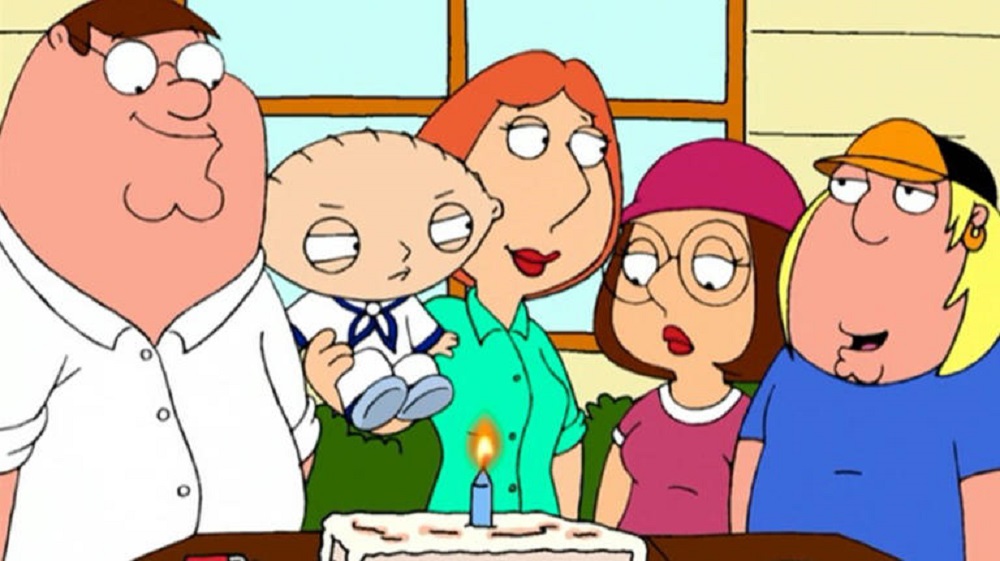The Real Place
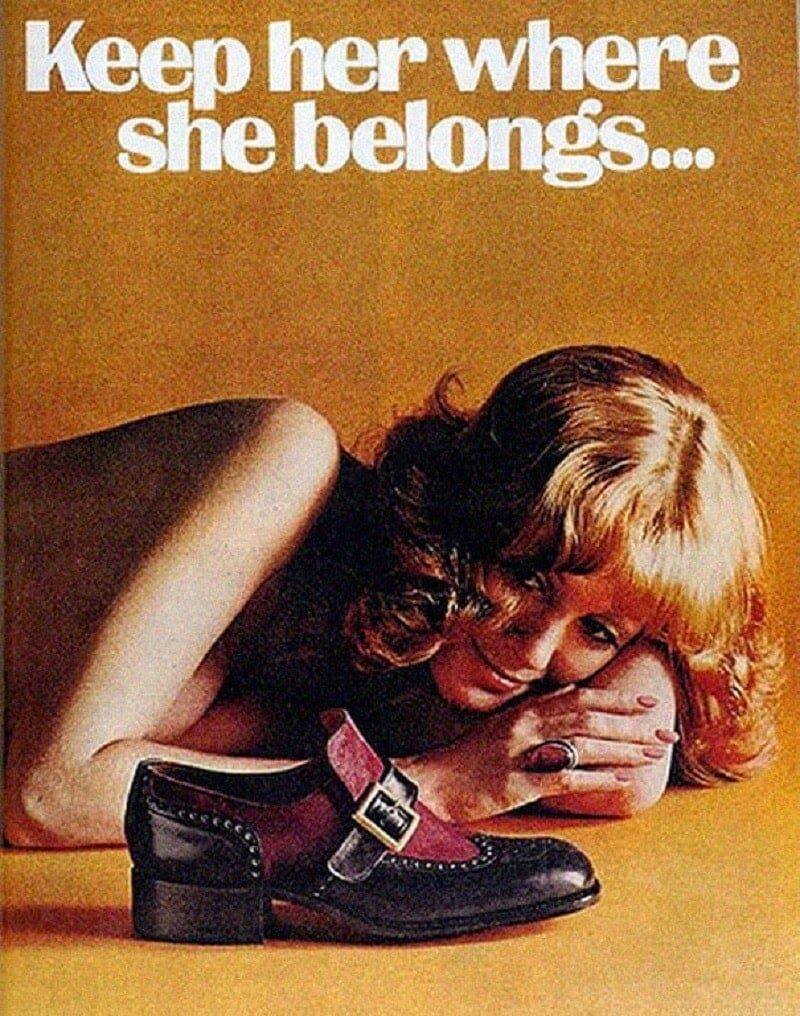
This '70s ad is a blatant example of misogynistic takes found abundant in the advertisement field in the previous century. The tagline for the ad suggests that women belong at men's feet, which is a ridiculous thought.
This kind of ad would not be received very well in today's society as the first wave of feminism emerged in the late 19th and early 20th centuries. Writers like Elizabeth Blackwell, Sojourner Truth, Dorothy Day, and Jane Addams were among the early activists that fought for women's rights. The White women started the move, and it was not until the second wave that women of color joined them.
In Ancient Times
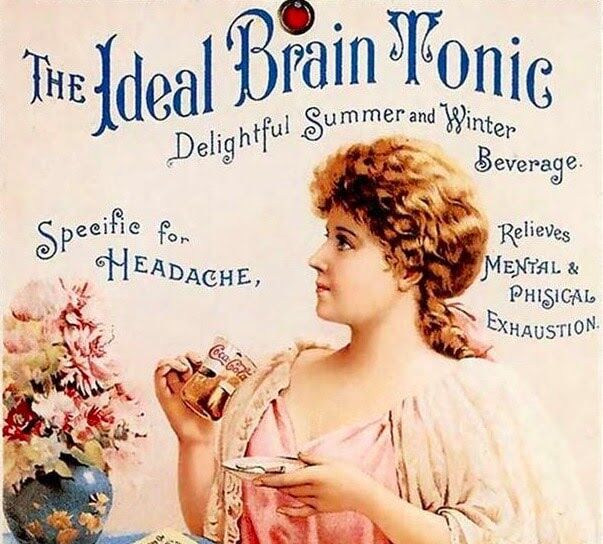
Coca-Cola, the world's leading brand of soft drinks, was once entirely something else. The product in the late 19th century and early 20th century was advertised as a medicinal and pain-relieving beverage.
It was suggested that the properties of some of its ingredients, like the fantastic Coca plant and the widely known Cola nuts, helped the customers relieve them of stress and ease their pain. It is incredible how far the company has come since its origin on May 8, 1886. The company introduced other Cola drinks with the name Coke. In 2013, the worldwide consumption of these drinks reached 1.8 billion daily.
The Unfair Trend
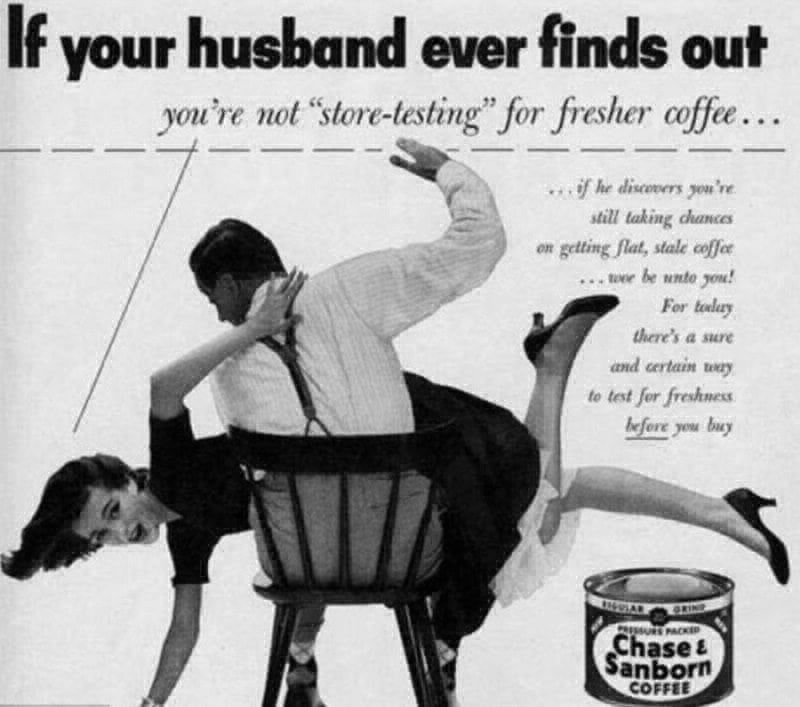
The unjust treatment of women has always been an issue in human history. The coffee brand Chase & Sanborn made this ad based on the '50s trend when all men were allowed to spank their wives with no eyebrows raised. The concept is to punish women if they don't do their chores well, and the girl in the picture is being hit because she brought out a stale coffee instead of serving a fresh one.
Chase & Sanborn Coffee was established in Boston, Massachusetts, in 1862 by James Solomon Sanborn and Caleb Chase. They were the first business to pack and ship roasted coffee in sealed tins.
The Real Duty
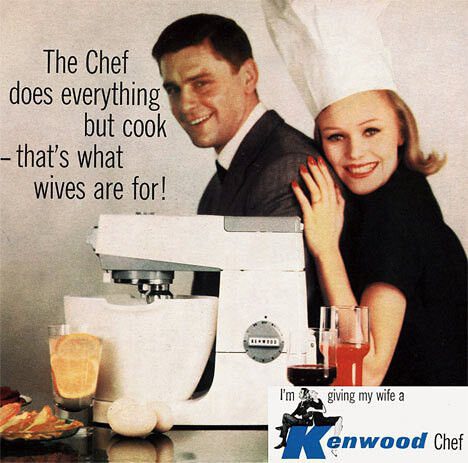
This ad is another example of gender marketing which is greatly discouraged in today's cultured world. This Kenwood Chef ad is based on the notion that it is okay to subdue women. Back then, it was more correct to assume that men were supposed to work in offices and all women were good for staying home and serving their husbands.
This ad by Kenwood Limited circulated in the '60s, a British manufacturer of kitchen appliances based in Havant, Hampshire. It designs kitchen appliances, including stand blenders, mixers, food processors, toasters, and kettles. Kenneth Wood founded the globally famous company in 1947.
Impressive Tie
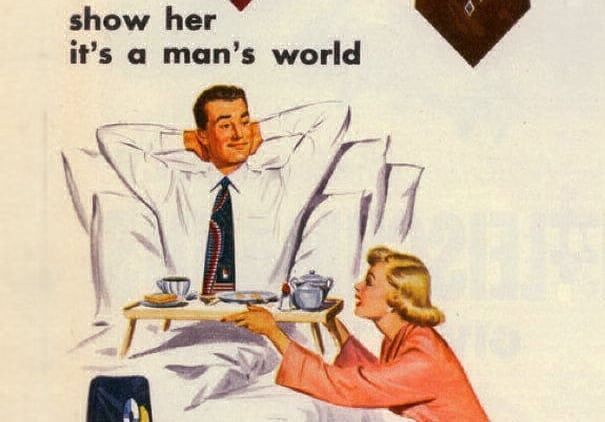
They say it's a man's world, and this ad for Van Heusen ties takes it in an absurd direction. In the ad, a smartly dressed man sat on his bed, but it doesn't make sense because who would go about sleeping or taking naps while sporting such formal attire?
A housewife on her knees is serving the man dutifully, placing an excellent breakfast in bed. Who doesn't love to wake up with some bacon and eggs? But in this case, the creative team tried to highlight an odd idea that you can make a woman serve you if you impress her with your tie.
Tiger Lady on the Floor
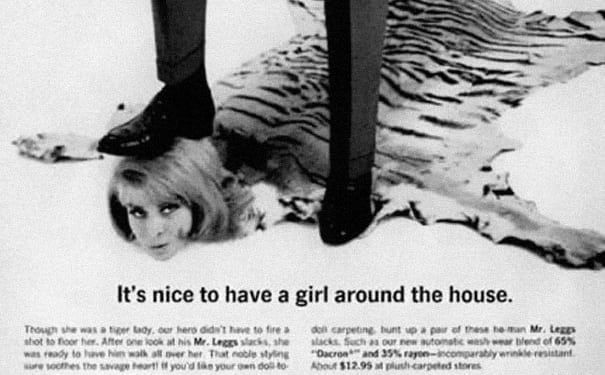
Mr. Leggs was once a leading brand in slacks and comfort wear for men. But they were no better than their contemporaries, who made massive money by propagating the inferiority of women. This ad titled "Tiger Lady on the Floor" circulated in the '70s. There are so many things wrong with this one ranging from picture to text.
The photo shows the husband with his foot on his wife's head, who's wearing a tiger rug. The ad emphasizes that if you buy Mr. Leggs' trousers, you can make any woman submissive and obedient like a hunted animal, no matter how powerful she looks.
A Unanimous Scent
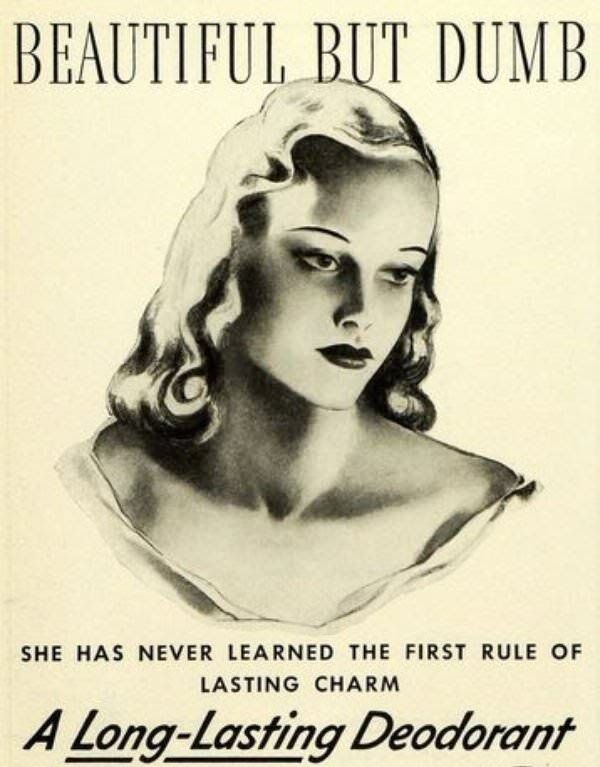
Odo-Ro-No was a fragrance company that revolutionized perfumes in the 20th century. It was among many other brands that used to objectify women to sell their products. They were just another company with morals associated with their time.
This ad by the company emphasizes that women are dumb and don't know the meaning of long-lasting charm. This leads the society back then to assume that women do not have a taste to choose classy and durable things for themselves, and don't take care of their hygiene. That is why the advertisers are implying that they should use a long-lasting scent in the form of a deodorant.
Like It's Made Just For You
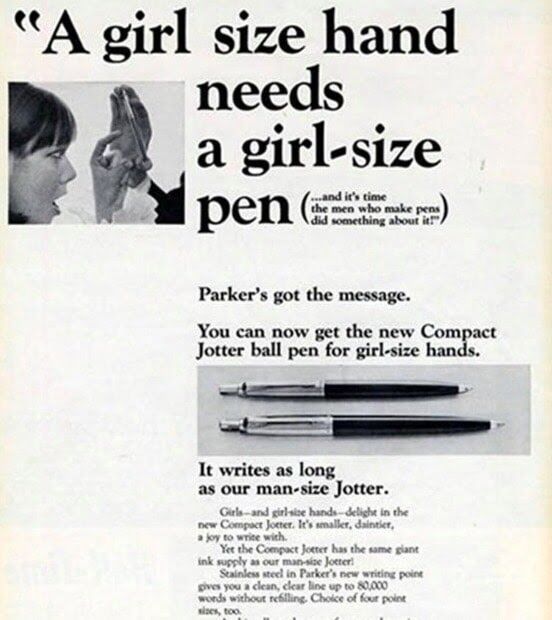
For decades, the advertising industry has profited from highlighting the differences between men and women. And most of the time, it was about both the genders' wants and not their physical features. But in the '60s, many advertisers took advantage of women's awareness of their rights and started designing things specifically for them.
This campaign is about the Parker Jotter pen, a pen designed to suit the size of a girl's hand, making it seem like they are all in for women's empowerment. The retracting refillable ballpoint pen is the Parker Pen Company's second best-selling product after the Hopalong Cassidy ballpoint.
A Dreadful Idea
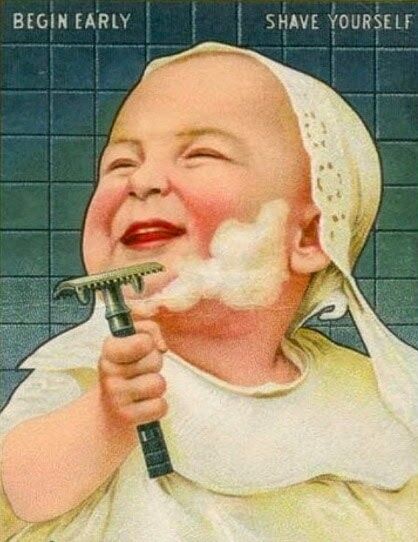
The idea behind this horrific ad makes no sense whatsoever. How this got into the printing process is beyond our knowledge, and we can only assume it's never in a good way. Understandably, sometimes the creative team of an advertisement won't be able to deliver an idea to its full potential. But the very idea of seeing an infant with a sharp object sends a chill down our spine.
If such an ad got released today, the creatives would be heavily criticized. Firstly, making a child hold a sharp razor can have serious consequences. Moreover, there is simply no need for a child to have a razor.
A Bizarre Packing
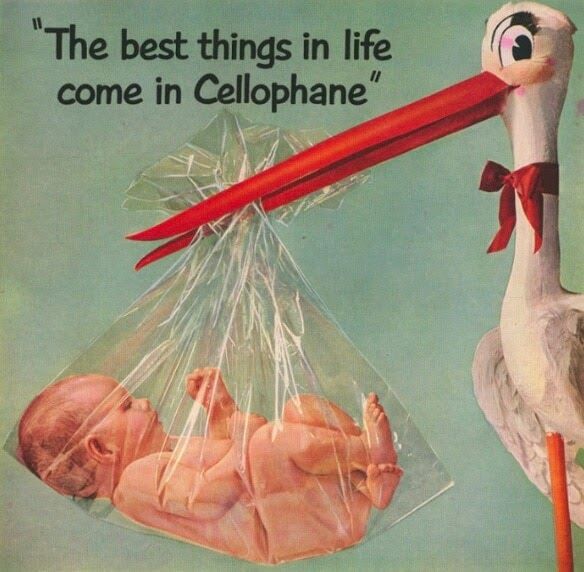
DuPont left no stone unturned to advertise their cellophane in the '30s. They thought the best way could be to reach housewives and involve babies. The company made many ads based on the same concept where they wrapped two and even three kids in cellophane to propagate the importance of the product.
The biodegradable material is made from cellulose and used to wrap candies, vegetables, gift baskets, etc. None in his right mind comes up with an idea as bizarre as confining a kid in a cellophane bag. The stork is a nice touch, but this should have been broadcasted with a disclaimer, "Don't try at home."
Super Hard Task
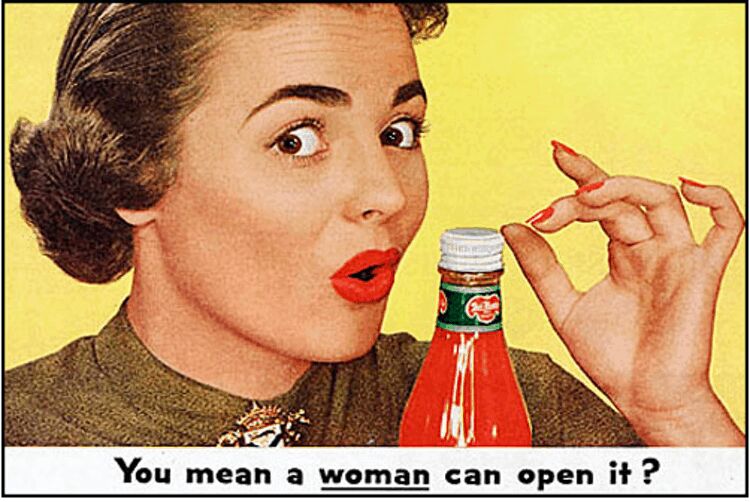
It is pretty clear that the creatives of this advertising company were deeply rooted in misogynistic takes. The ad shows that women are less powerful, so there is a need to design unique covers that ladies can remove easily. It seems like they forgot that women constantly work in the kitchen opening all sorts of bottles and food cans and do not need any help.
In this case, the product description and targeted audience remain unclear, but the message is still fully understood. The makers chose a ridiculous caption that highlights gender inequality, thus following the era's steps to portray women as weaker entities.
The Tennis Game
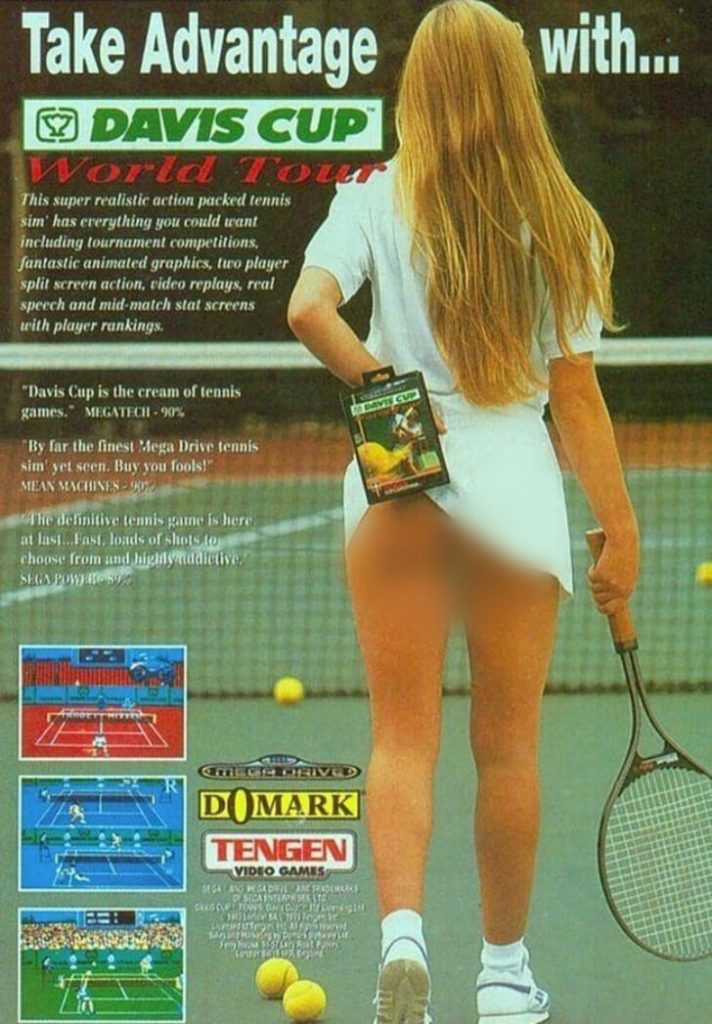
The advertisement is from American video game publisher and developer Tengen Inc. It highlights the absurd idea that while preparing for the tennis world cup, it would be great for the players to practice on their video games instead of coming to the net.
The presence of a female player is pretty strange as The Davis Cup is the exclusive international team event in men's tennis. It was founded in 1900 by Dwight F. Davis, who arranged the first match between the United States and Britain at the Longwood Cricket Club. The Cup continued throughout the years but in 2022, Russia and Belarus had to be suspended due to the invasion in Ukraine.
A Magical Drink
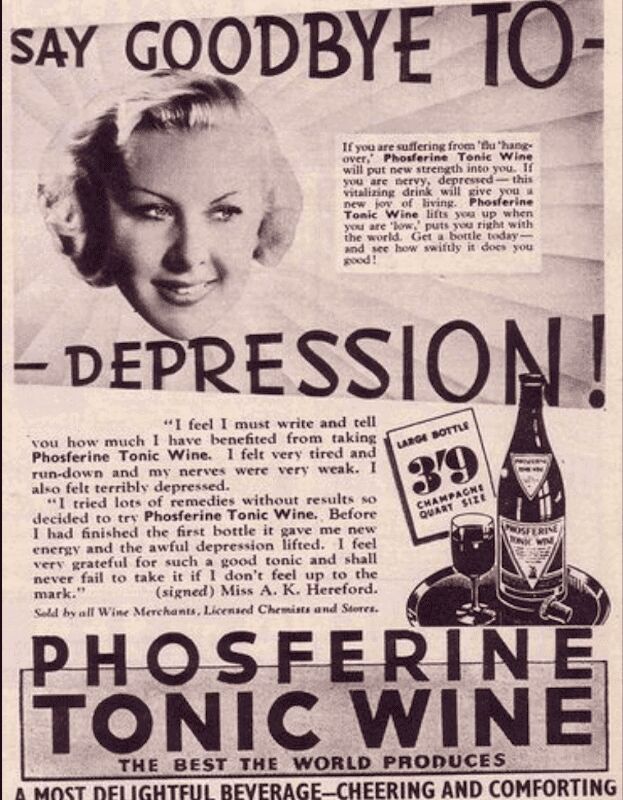
Some people find it quite relaxing to have a glass of wine after a hectic day. Still, other immediate measures should be taken if you are experiencing any down thoughts; for example, some specific online forums like Healthline teach how to get rid of anxiousness and the general feeling of being overwhelmed. But this advertisement asserts that their wine is the proven solution to the depression and other health concerns.
The Phosferine wine, available in a one-liter bottle, was enriched with a herbal supplement that swore to cheer you up and soothe tensed nerves. Still, the ad can be misleading since mental concerns are severe issues and it should not be taken lightly.
Feeding The Kids

Handling kids is never an easy task, and it's even a lot harder when feeding them. They may try to throw tantrums just to avoid eating, since they are still unaware that their body needs energy from food to keep them energized and active. Chiquita Brands International Inc., now known as Chiquita Brands International Sàrl, is the leading American distributor of bananas.
Through this ad, they are appealing to kids to eat bananas together as banana is a great fuel for their brain that enhances their intelligence and memory with the help of potassium, vitamin C, manganese, and fiber that it contains.
Target Audience
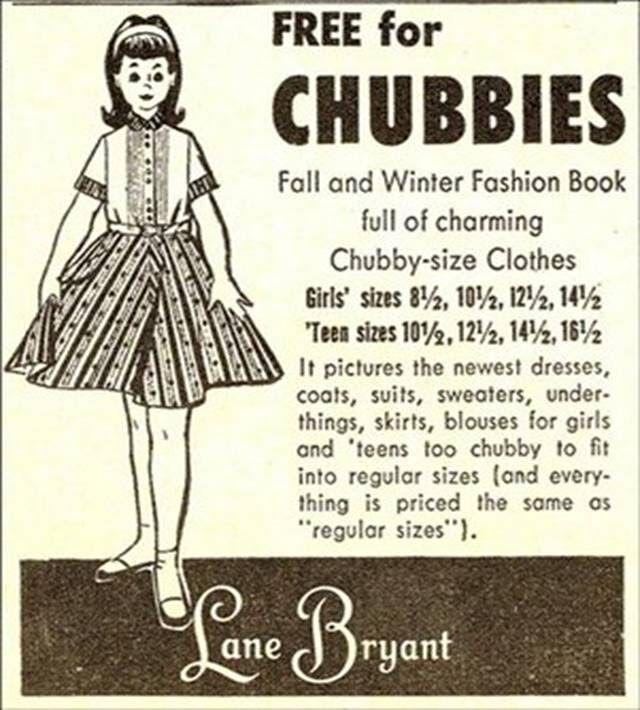
Unlike some other trends, this advertisement seems to promote body positivity in women. In the most decent way possible, the company is giving confidence to the women that they too can follow every trend like how the slimmer and slender girls can.
However, using the term "chubbies" can sometimes be considered insulting and could have been replaced with something nicer. Lane Bryant, the clothing company, featured in this ad, has been serving women's apparel since 1904, and it is the largest plus-size clothes dealer in the United States. The business began with maternity designs created by Lena Himmelstein Bryant Malsin.
An Agreed Choice
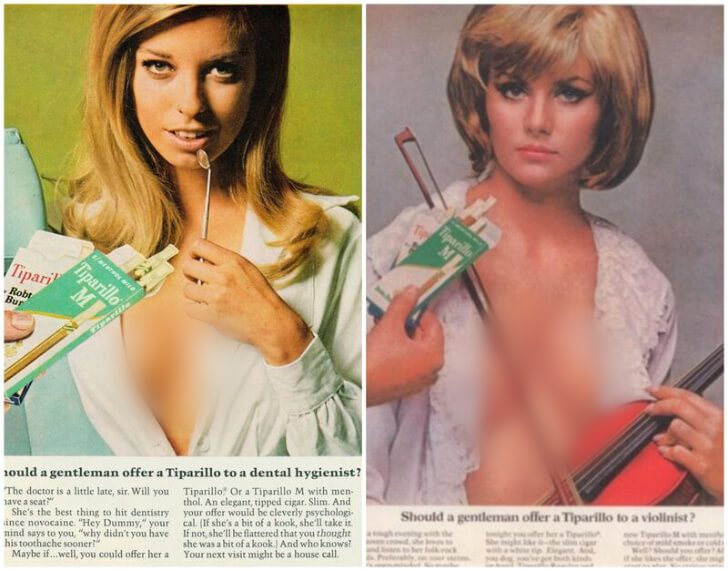
Almost all the commercials today have lovely women to seemingly gain people's attention and boost sales, taking into account the "male gaze." It seems true when looking at this poster promoting the idea of a chic woman, be it a dentist or a violinist.
In this ad, the General Cigar Company proudly introduces their cigar, which is equally popular with women in all professions. The other point is an attempt to highlight the ridiculous point of tobacco being good enough to be liked by a dentist. The ad was the part of the campaign when Postwar cigar makers started attracting young smokers and women.
Wedding Day
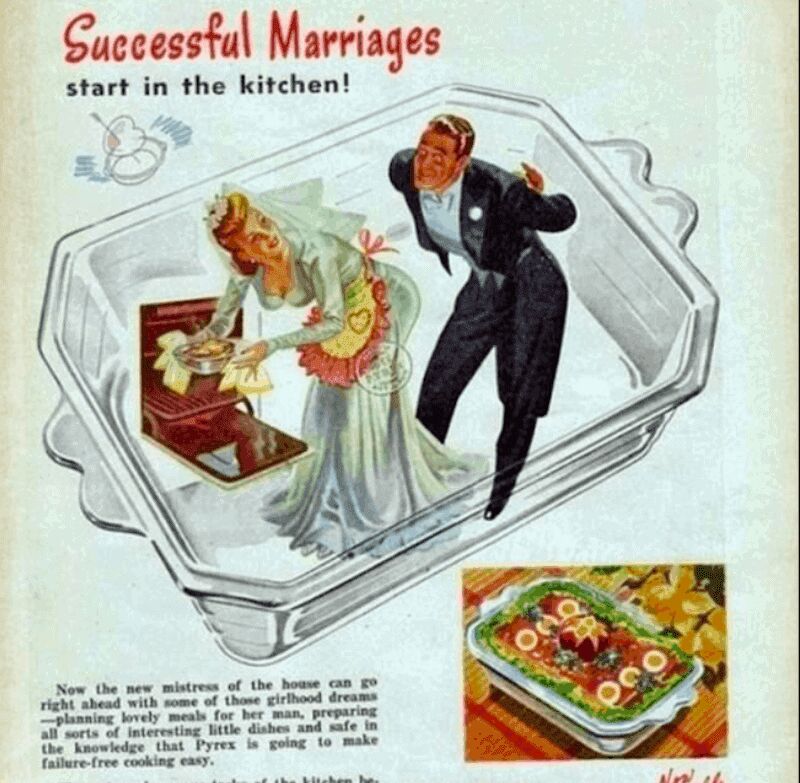
The Pyrex kitchen brand used the best tactic to gain profit and popularity by cashing in on one of the evergreen traditions we have in society: marriage. This brand has been around for so long and is famous, and there is no doubt about that. But, their ads are probably trying to over-promise their customers.
The tagline of this ad sounds a bit illogical. There are more vital factors than just lending a hand to making a marriage successful; like trust, love, respect, and absolutely not cooking in the bridal dress. Hope no one would have copied the bride in the picture.
The All-Time Favorite
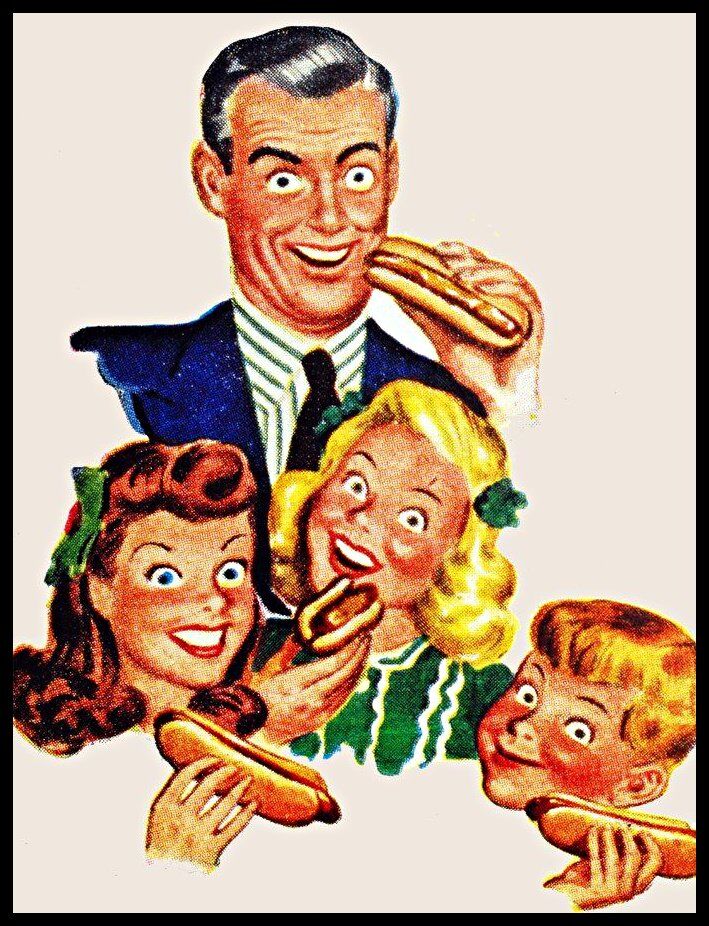
Specifically connected to New York City and its cuisine, the ever-favorite hot dogs trace their history to the German immigrants in the 1800s. The immigrants brought the sausages and their dachshund dogs to America. This strange name of the food came from when they started joking about these long and thin dogs.
Hot dogs are a staple food item for people who cannot afford expensive meals. That is why in the time of the Great Depression, most advertisers marketed hot dogs as an all-time favorite. Even this poster shows that the parents and their children chose the same food while having quality time.
A Child’s Power
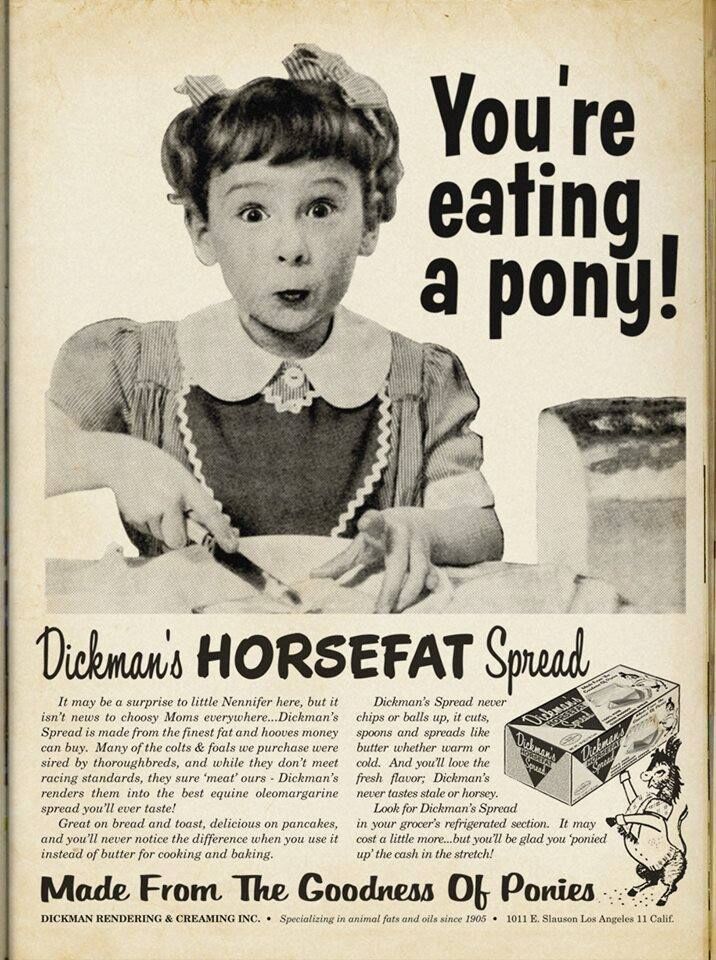
The ad from the '50s promotes Dickman's Horse Fat Spread, a butter alternative for toast, bread, and pancakes. The manufacturers proudly reveal with the picture of a cute girl that consuming the spread is like eating a pony, which is true. They emphasize the product's goodness by relating it to the health of children who need a lot of energy for their super-active daily routine.
Today the kids and elders have several choices of spreads in the United States like Apple Butter and Pepper Jelly, and there is no need to make horse slaughterhouses to provide children the energy they need.
Soviet Glamour

The enchanting fashion models who appeared on posters in the '40s and '50s were called Pinup girls. The posters were officially issued by the representatives of local parties of the government. The only difference is that these are illustrations and not actual photographs and were mostly used in America to hang in places like garages and restaurants, all for the sake of aesthetic.
These specific posters in the ad are vintage Soviet pinups representing Russia's working class and were made by Valery Barykin. He made himself a big name through this series and was known to mix Russian and American styles in his art.
Hard To Convince
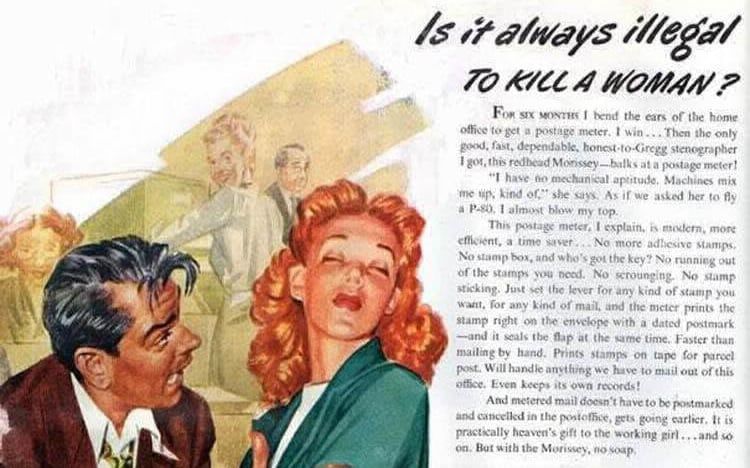
With its conflicting title, this is a short story of a salesman who always had difficulty convincing women to buy his products. The quality of a good salesman is his effortless convincing skill, though it takes great effort. Still, it does nothing when women initially refuse to take the things. But a good seller never gives up.
So the writer explains the steps of how women come around. A constant alluring speech can make up the customers' minds to try it. They seem to be giving an absurd lesson: you should keep trying if you want something, and only stop when you achieve it.
The Sunny Lamp
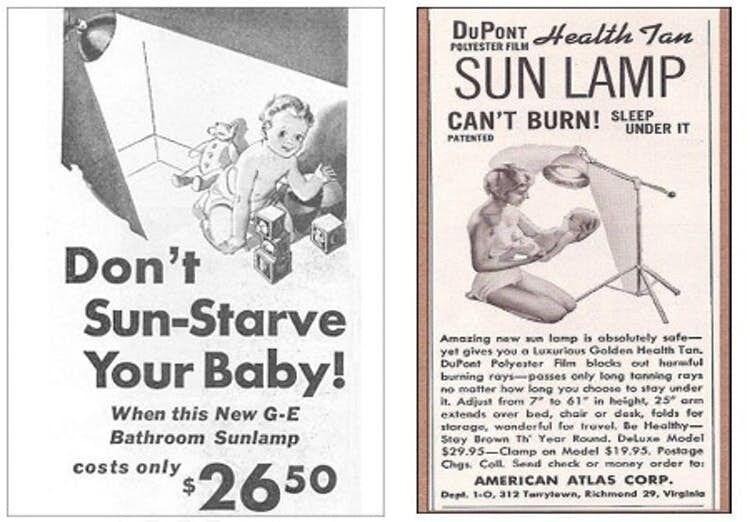
Be it today or in the '30s, when it comes to marketing, the advertisers can get many benefits by keeping children their prime target. The philosophy behind this was the constant search of the parents for the next best thing to keep their kids overall healthy and happy.
In this ad, DuPont portrays their sun lamps as the best choice for infants. The makers are suggesting mothers keep their kids from sunburns and replace the exposure to the sun with this lamp. Designed to keep kids warm, these lamps are good options because it is marketed that they don't emit UV rays.
The Beneficial DDT
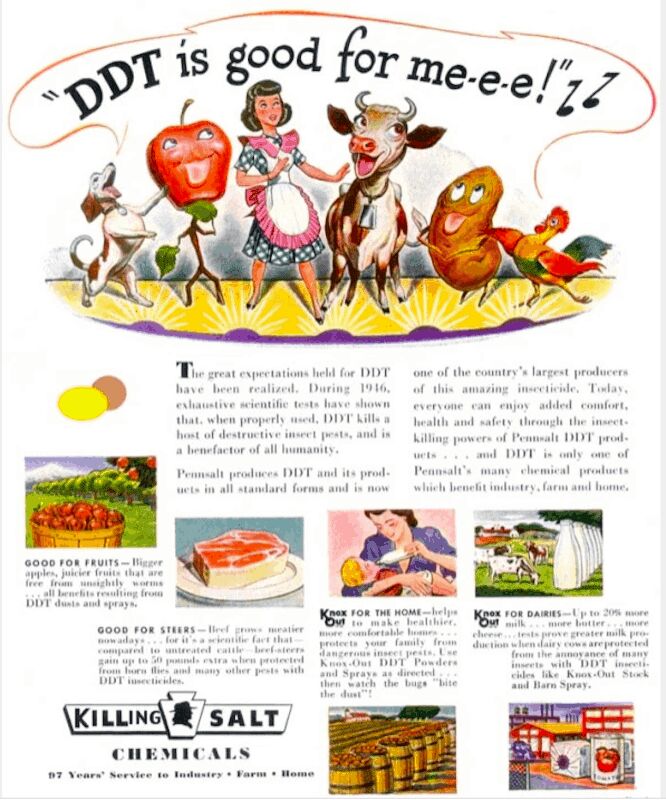
Dichlorodiphenyltrichloroethane, the magical substance, is popularly known as DDT. Its first introduction to the world in 1874 became known as a highly effective insecticide and a pro for getting rid of those stubborn mosquitoes. It also helped in growing fruits and vegetables larger than usual.
Things took a massive turn for the manufacturers when they began selling this as an excellent cleaning agent; the sale grew manifolds because it was classified as an essential household necessity. The ad highlights the number of uses of DDT as the United States widely used it until the U.S. Environmental Protection Agency withdrew it in 1972.
Me Time
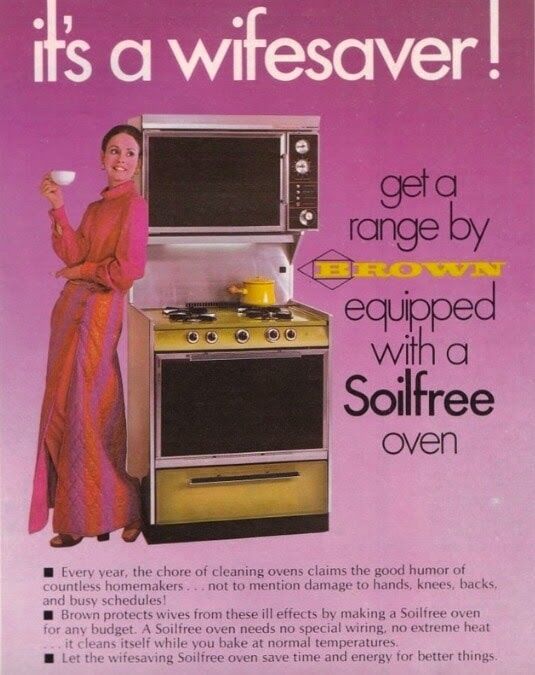
At last, there is a product that allows women to enjoy some 'me time' as it does not require them to spend much time cleaning the oven, etc. This Soilfree oven by Brown offered homemakers a variety of soil dust ovens where they just cooked and didn't bother cleaning it after doing their business in the kitchen. That's why we see a woman enjoying a cup of tea to refresh herself after cooking.
The soil dust stoves are self-cleaning or pyrolytic stoves that use high temperatures like 932 °F to burn off scraps from cooking, and they do not use any chemical agents. The ovens were powered by domestic gas and electricity.
The Cost of Beauty
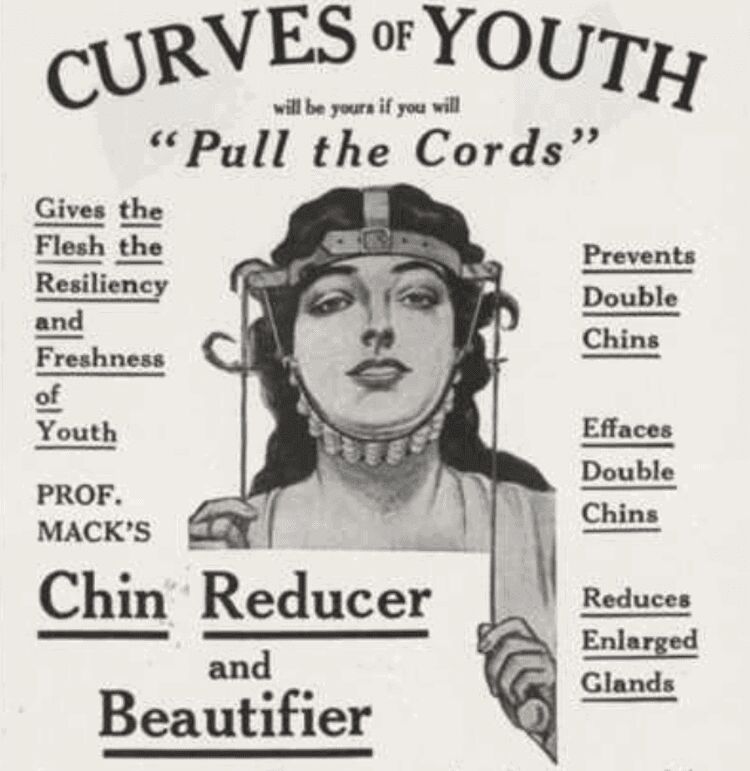
This 1890's ad for Mack's Chin Reducer and Beautifier gives a detailed account of all the benefits women can have by using it. This is a massager that tones the face shape and reduces the double chin. It seems that the period's only focus was to make women perfect.
But nowadays, no one prefers this hard-to-use massager as today people know about chin augmentation. It is a cosmetic surgery process to alter the facial features' underlying structure, assuring a better balance of facial features. In medical terms, mentoplasty is meant for reduction, while genioplasty is done to add to the patient's chin.
A Stereotype
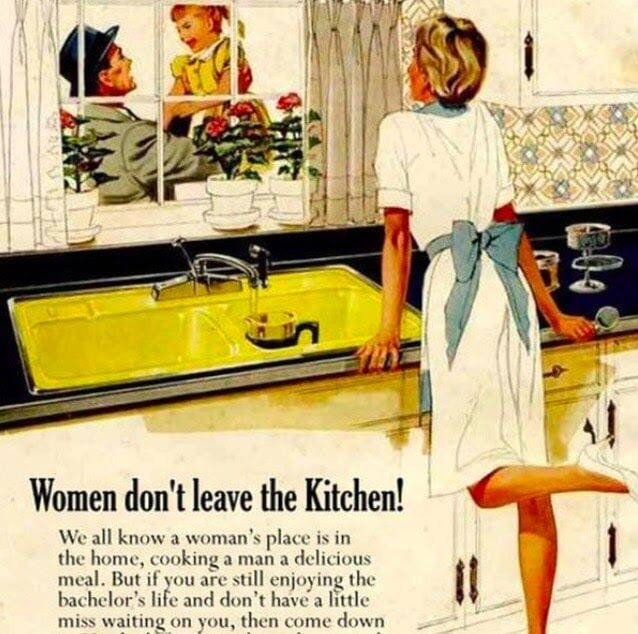
Kohler Co. is a pretty old and famous name in the plumbing sector as it has been manufacturing plumbing products. Moreover, the company also manufactures cabinetry, furniture, tile, engines, and generator. Founded in 1873 by John Michael Kohler, the company won millions of housewives' hearts by making their relationships easy. But their publicity campaigns, too, were not complete without promoting strange concepts about women.
In the ad, the dad is playing with the child while the mom is enjoying the scene without leaving the kitchen. Back then, the kitchen is the perfect place for a woman according to the philosophy of that era.
The Ketchup Girl
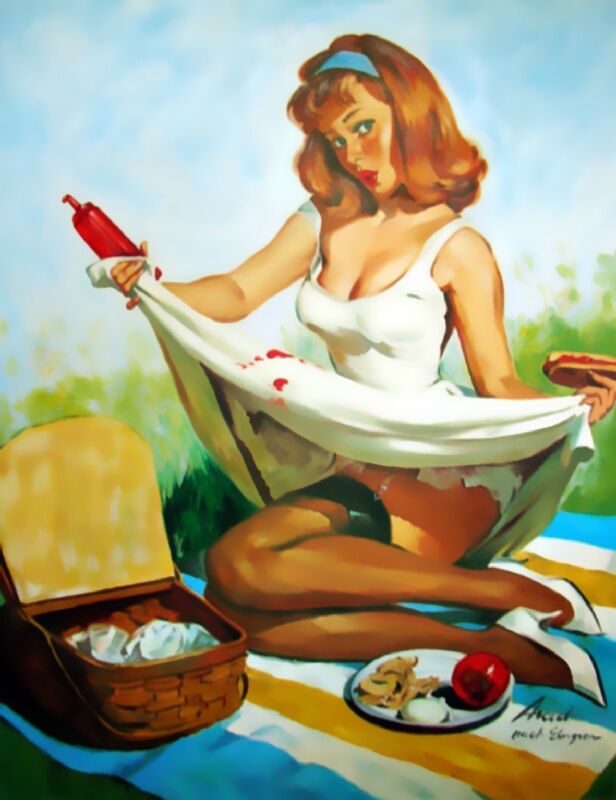
Gil Elvgreen made this wall-mounted pin-up. He is an American painter recognized for his creativity in making illustrations, pin-up girls, and advertising. His prestigious clients ranged from Coca-Cola, Brown, and Bigelow to Sealy Mattress Company and General Electric. This charming portrait was one of many of Elvgreen's creations that received attention and applause globally.
His specialty was to paint these girls in everyday situations and make them look stunning and more appealing in a way no one could. We cannot presume whether or not these pin-up posters would have worked today, but in the '30s and '40s, it was a profitable trend.
The Only Thing That Matters
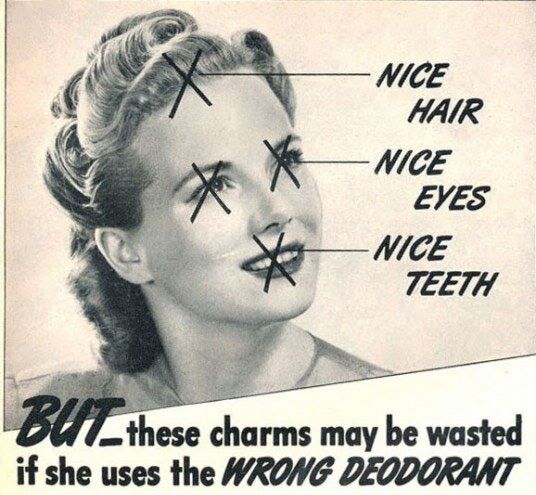
It is natural for the human body to sweat due to physical exertion, heat, or stress, and it also causes odor. Sweat glands secrete a salt-based fluid that helps regulate the body temperature. This phenomenon is common to males and females, but the woman-biased creative team weaved the idea to embarrass women while selling their scents.
According to them, beauty and charms can bring no good to women if they do not make the right deodorant choice. We cannot understand the excessive focus of the '90s ads on highlighting the shortcomings that hinder women from becoming perfect creatures, from body hair down to their sweat.
Women Can Drive
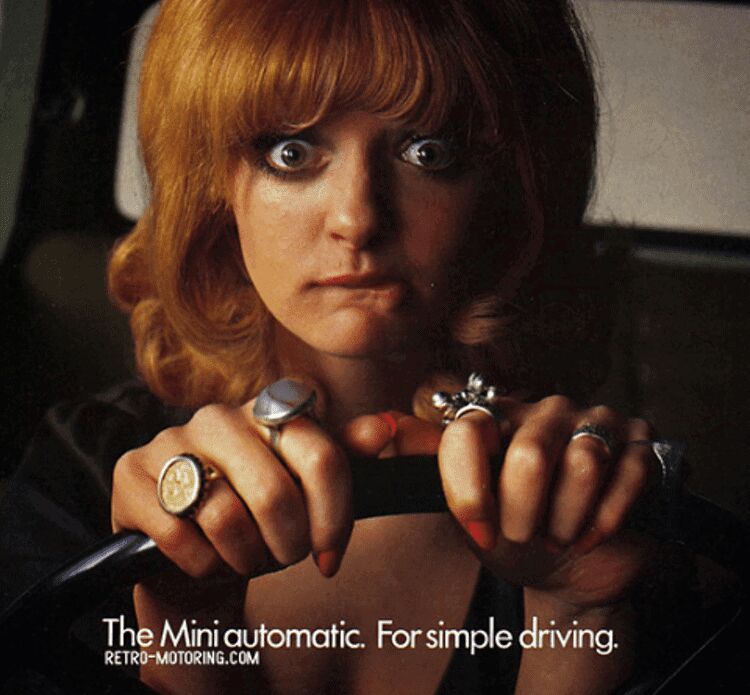
In the '60s, women started to get out of their shells. They were not staying inside four walls to cook and clean anymore. Few advertisers took that notice and started inventing products inclined toward women, like this car named Mini automatic. Ironically, the concept of women being inferior remains there, denoting that they cannot drive the usual vehicles as men.
The fact is women can do everything a man can. According to bankbazaar.com, female drivers normally do not opt for overspeeding. Most drive at a manageable speed and prefer to keep it steady. And women drivers surpass speed limits 12% less than men drivers.
An Alternative
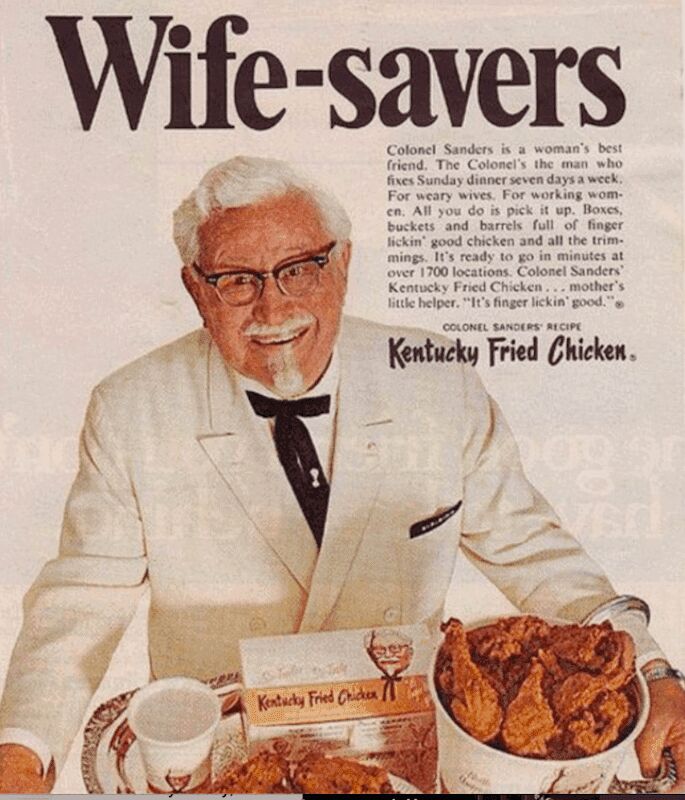
This brilliant ad was published in November 1968 in Better Homes and Gardens magazine. It pleads that women need a break from cooking, and during their respite, KFC is supposed to cook for them and their families. The advertisement shows the most recognizable face of fast food entrepreneurship, Harland Sanders, aka Colonel Sanders.
KFC is an American fast-food chain that specializes in fried chicken. Its headquarters is in Louisville, Kentucky, and as of December 2019, it still successfully operates globally in 150 countries and has 22,621 locations. It makes it the world's second-largest restaurant chain in terms of sales after McDonald's.
A Deadly Idea
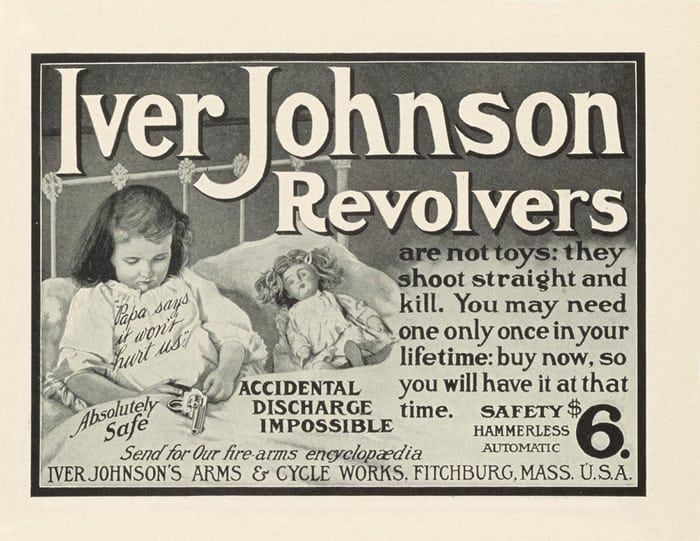
This may be the worst ad you will ever see. Instead of playing with her doll, the little girl is busy loading the Iver Johnson revolver, with the message that heavily warns they are not toys, but it assures no chances of accidental discharge. Iver Johnson was named after its Norwegian-born founder of the same name.
Maybe the creative team could not think of something more appropriate for this pre-1907 ad to highlight the features of the revolver. This insane ad should have been banned immediately. From 1871 to 1993, the company manufactured motorcycles, bicycles, and firearms. In 2006, a company called Iver Johnson Arms started but had nothing to do with this company.
Is It Natural?
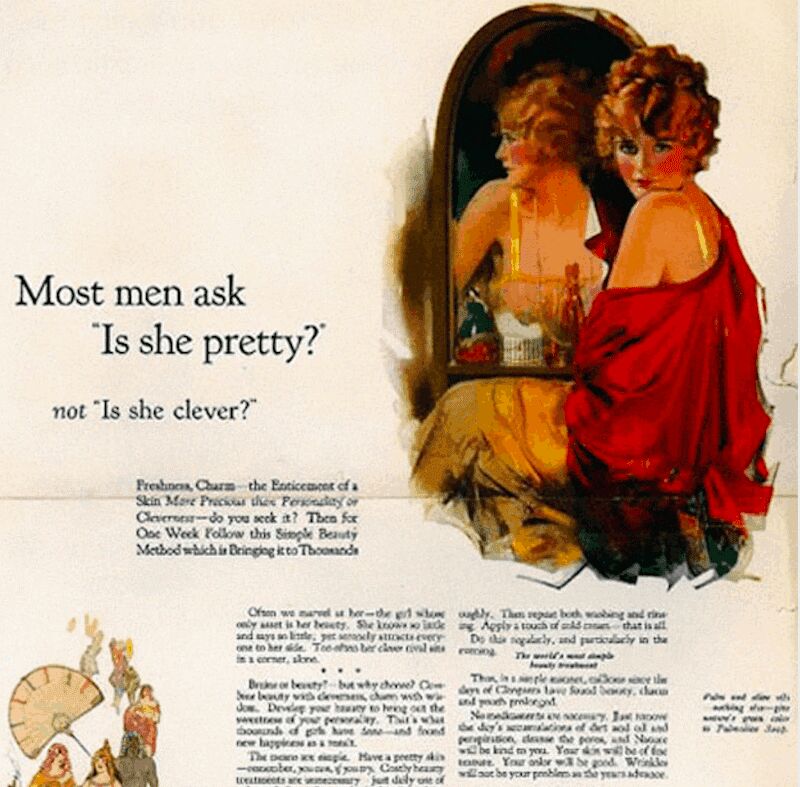
This Palmolive ad from the '20s propagates a ridiculous idea that being beautiful and fair-complexioned is better than being intelligent. Another point they have is whatever women do is always meant for the men, so women should look beautiful with the help of Palmolive soap to gain their constant attention.
American multinational brand Palmolive manufactures a line of products, along with its parent company, Colgate-Palmolive, which originated in 1898. Their beauty soaps with the name Palmolive Naturals are widely used. The diverse range includes five soaps in different colors with the titles Moisturizing Glow, Hydrating Glow, Radiant Glow, Flawless Glow, and Refreshing Glow.
To Stay Fit
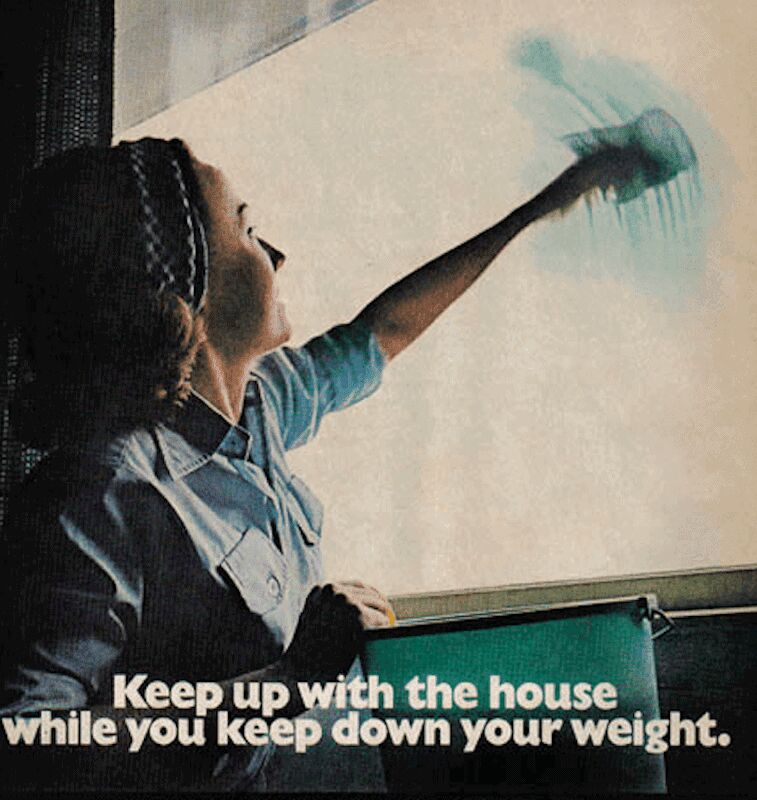
There are two pinching concepts promoted in this ad by General Mills that would not be received very well today. The first is about women's natural duty toward household chores like dusting and cleaning, and the second is the promotion of body shaming. The advertisement denotes that the women should watch their weight, and cleaning is the easiest way to regulate it.
It should be kept in mind that cleaning and washing are essential life skills everyone should master, and it is not about gender roles. They could also be promoting a life hack, which is to clean glass using a microfiber cloth or a coffee filter.
What To Project?
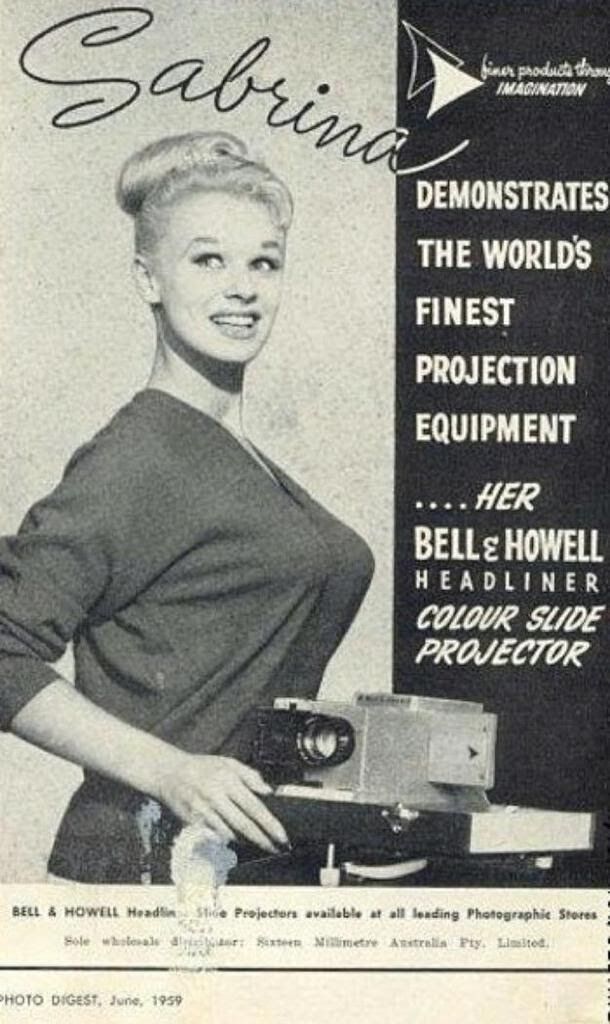
The ad published in June 1959 seems to be publicizing the Bell & Howell projectors, but the product is not the first thing viewers notice. The ad is just another example of how they thought that the presence of a woman could increase the glamor quotient of an ad.
Do you know how a projector works? Zoopraxiscope (projector's glass) rapidly moves the still images by rotating glass disks to create a motion effect for the viewers. The first successful movie projector was invented by the Lumière brothers, who based it on the work of French inventor Léon Bouly, who created the word "cinematograph."
A Candilicious Temptation
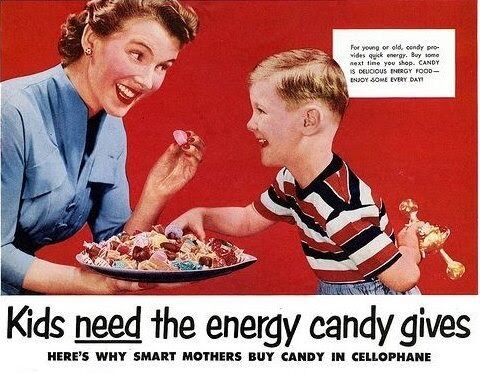
Everyone loves candies, and no one refuses when it is offered. This small sweet treat is the weakness of every child, and they love all sorts of crunchy, soft, or gummy candies. As children need so much energy to play outdoors, the ad advocates the need for energy through the sugar of the candy.
Sugars are a form of carbohydrates, and like all carbohydrates, they are a source of energy in our daily food intake. According to the American Heart Association, males should consume no more than 36 grams of added sugar, which provides 150 calories; for women, the recommended quantity is 25 grams, which gives 100 calories.
Raising The Attraction
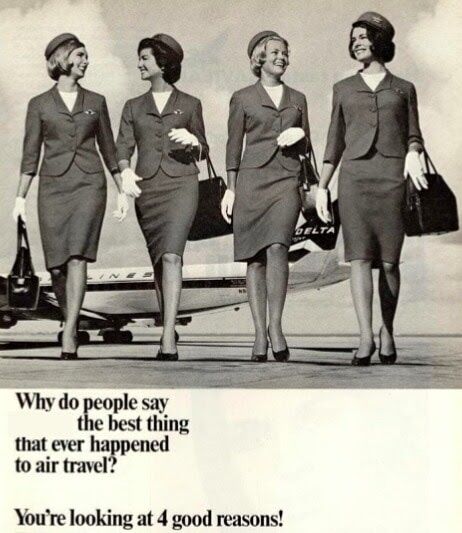
When air travel's first companies started to be commercialized, it was a great idea to make flight attendants a part of the marketing campaign. So in this particular ad, Delta Air Lines management is trying to tempt their potential passengers to fly with them as, along with many other facilities, they have sophisticated flight attendants.
Delta Air Lines was founded on March 2, 1925, in Macon, Georgia, United States, and started its services on June 17, 1929, and the almost a century-old airline has reached a fleet size of 877. Its founder was C.E. Woolman, and the company's 2021 revenue was $29.90 billion.
No Skipping On Breakfast
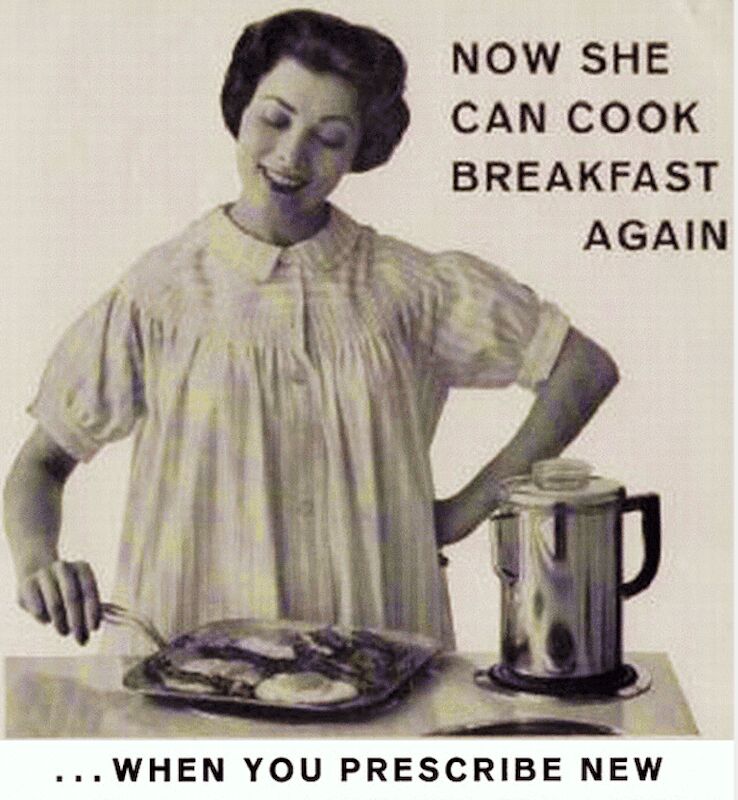
This 1959 ad was about Mornidine, a medicine that helped pregnant women get rid of morning sickness. The idea of the ad revolves around the 19th-century notion that women function best when they are in the domestic sphere. So, true womanhood rested in cooking food uninterruptedly while expecting a child.
Women can be bothered by morning sickness in pregnancy, but its reasons may vary. It may be due to low blood sugar or the surge in pregnancy hormones, such as estrogen or human chorionic gonadotropin (HCG). Morning sickness can even be made worse by being overtired, stress, having sensitivity to motion, or eating certain foods.
The Secret
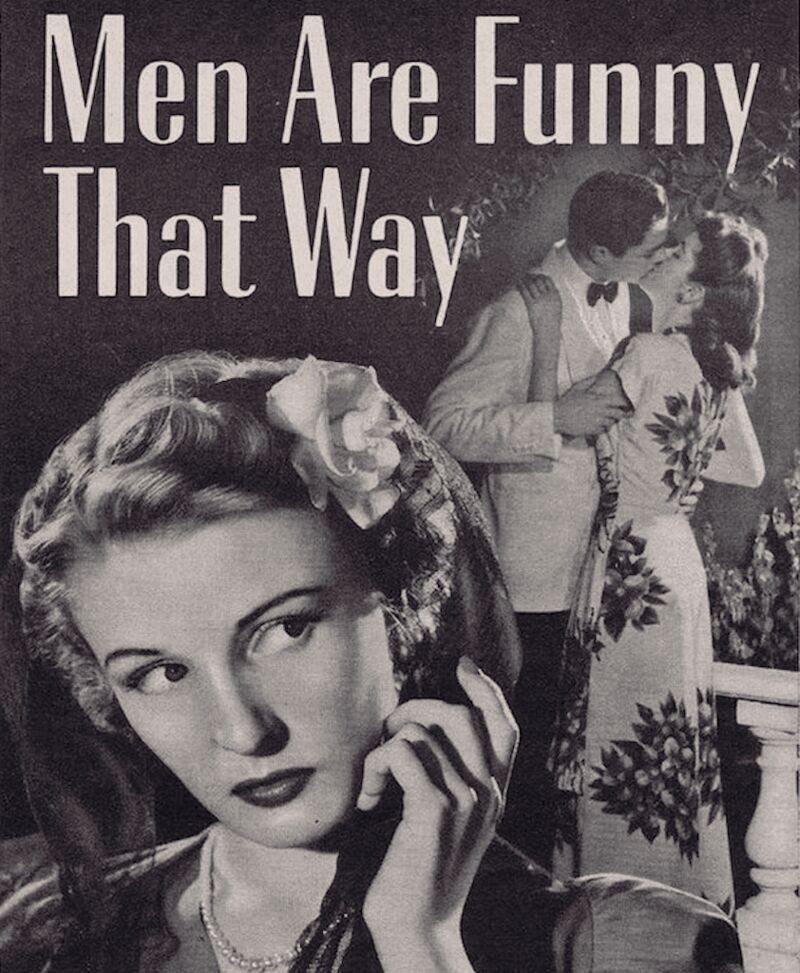
The main idea in the above picture is pointing at the bitter fact that some people around us have such smelly mouths that talking to them becomes intolerable. So this ad for Colgate dental cream highlights the effects of cleanliness of teeth and breaths on your romantic life.
Colgate's toothpaste adapted its current corporate name in 1953. Colgate & Company marketed their first toothpaste in a tube form in 1896 and named it Colgate's Ribbon Dental Cream. Palmolive-Peet Company bought the firm in 1928, the same company whose founder, B.J. Johnson, had developed the formula for Palmolive soap in 1898.
The Desperate Soul
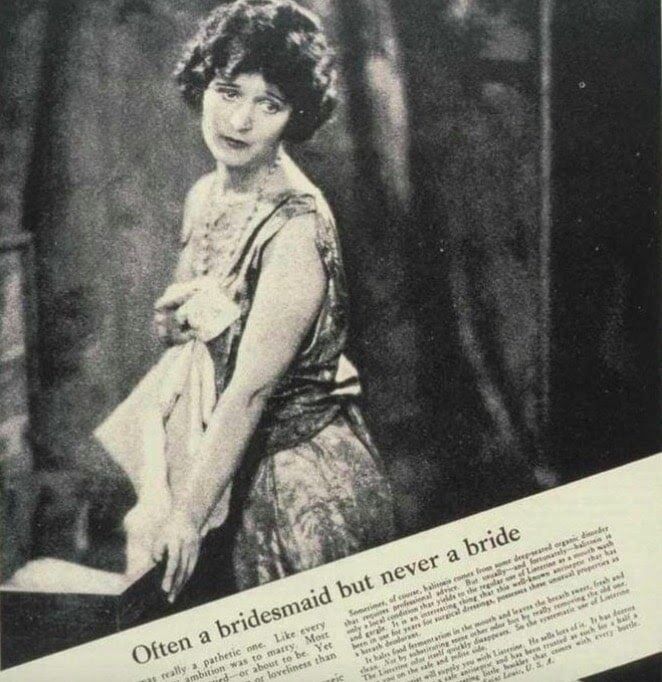
This ad tries to portray the feelings of a girl who is still unmarried while everyone in her friend circle already has. Every girl has dreams of her prince charming and a fairytale wedding, but when the plans take too long to materialize, the amount of frustration mounts up.
There circulate several myths about the right age to get married. But research says that the best age to marry is between 28 and 32, as the couples falling in this age range split up the least. It was studied at the University of Utah by a sociologist named Nick Wolfinger and was published by the Institute of Family Studies.
The Men Catcher
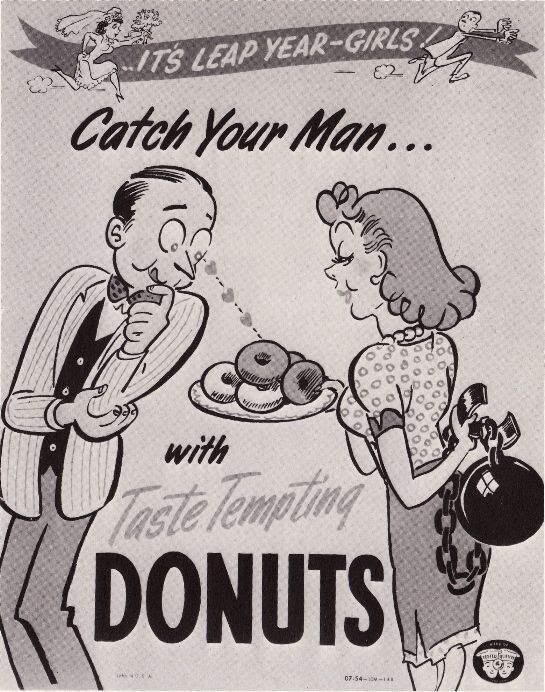
Many people are food lovers and have great taste in food and drink. They say that in attracting a man's attention, it is good to invite him over for something that can please his taste buds. This ad suggests women grip their man, be it their husbands or boyfriends, with doughnuts' irresistible taste and aroma.
If we try to trace the origin of this food favorite, the food resembling doughnuts has been discovered at many ancient locations, but it is believed that Dutch settlers brought them to New York. They called it 'olykoeks,' which means oil cakes, and they started making it in the mid-19th century.


